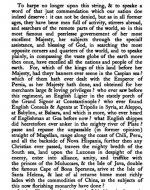PolarBear
Major
- Joined
- Feb 24, 2007
- Messages
- 6,706
I came across Richard Hakluyt's dedication to Cecil Walsingham in his 1589 edition of his Principles of Navigation which gives a good idea of the extent of British imperial intentions at that time under the reign of Elizabeth I. It was of interest to me how these areas are still very much making our contemporary history and the role of the British Empire in the making of the modern world that we have inherited.
Here is part of the dedication and some modern commentary and annotation:
The gratitude he expresses to Cecil in the later introductions encourages the belief that his plaint did not go unheard. Though Hakluyt had to deplore the scarcity of his materials, and to labour under the multitude of his enquiries and the magnitude of his task, he was sustained until the end and spurred to boundless enthusiasm by the subject which he had made his own. He was full of pride in the deeds of Englishmen in former ages, but declared that in Elizabeth’s time, they had excelled all the nations and people of the earth. Their half-concealed achievements were at last embodied in his own pages.
Which of English kings, he said, before her Majesty, had seen their banners in the Caspian sea? which of them had ever dealt with the emperor of Persia (Iran), obtaining large privileges for merchants? whoever saw, “before this regiment, an English Ligier in the stately porch of the Grand Signor at Constantinople?” Who, he asks, had ever found English consuls and agents before at Tripolis in Syria, at Aleppo, at Babylon and at Balsara (Basra, Iraq), and, what was more, who had ever heard of Englishmen at Goa (India) before that time?
What English shippes did heretofore ever anker in the mighty river of Plate? passe and repasse the impassable (in former opinion) straight of Magellan, range along the coast of Chili, Peru, and all the backside of Nova Hispania, further than any Christian ever passed, traverse the mighty bredth of the South Seas, land upon the Luzones in despight of the enemy, enter into alliance, amity, and traffike with the princes of the Molluccas and the Isle of Java, double the famous Cape of Bona Speranza (Cape of Good Hope, South Africa), arrive at the Isle of Santa Helena, and last of al returne home most richly laden with the commodities of China, as the subjects of this now flourishing monarchy have done?
Here is part of the dedication and some modern commentary and annotation:
The gratitude he expresses to Cecil in the later introductions encourages the belief that his plaint did not go unheard. Though Hakluyt had to deplore the scarcity of his materials, and to labour under the multitude of his enquiries and the magnitude of his task, he was sustained until the end and spurred to boundless enthusiasm by the subject which he had made his own. He was full of pride in the deeds of Englishmen in former ages, but declared that in Elizabeth’s time, they had excelled all the nations and people of the earth. Their half-concealed achievements were at last embodied in his own pages.
Which of English kings, he said, before her Majesty, had seen their banners in the Caspian sea? which of them had ever dealt with the emperor of Persia (Iran), obtaining large privileges for merchants? whoever saw, “before this regiment, an English Ligier in the stately porch of the Grand Signor at Constantinople?” Who, he asks, had ever found English consuls and agents before at Tripolis in Syria, at Aleppo, at Babylon and at Balsara (Basra, Iraq), and, what was more, who had ever heard of Englishmen at Goa (India) before that time?
What English shippes did heretofore ever anker in the mighty river of Plate? passe and repasse the impassable (in former opinion) straight of Magellan, range along the coast of Chili, Peru, and all the backside of Nova Hispania, further than any Christian ever passed, traverse the mighty bredth of the South Seas, land upon the Luzones in despight of the enemy, enter into alliance, amity, and traffike with the princes of the Molluccas and the Isle of Java, double the famous Cape of Bona Speranza (Cape of Good Hope, South Africa), arrive at the Isle of Santa Helena, and last of al returne home most richly laden with the commodities of China, as the subjects of this now flourishing monarchy have done?



